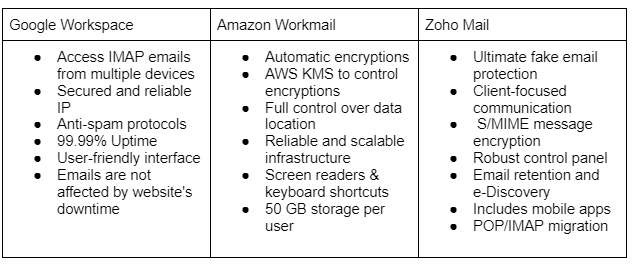Do I Need Hosting for Email?

Do you remember when email addresses were only on domains like Gmail and Yahoo? If you come across major companies' websites, you will see that their email address ends with [The name of the company.com]. What is that? That is the magic of email hosting!
Investing in premium email hosting services to store all documents on your own domain is a necessary step for major corporations. Not only does an email address with your company's name look professional, but it also eliminates data exposure risks. Clients are more inclined to use your services when they are reassured that their information is safe.
What Are Different Types of Hosting?
Think of hosting as a storage space. Your website's data is stored in this storage, and you can access, manage, and control it however you want. Different types of hosting, including Cloud hosting, dedicated hosting, and VPS hosting offer different storage capacities, server speeds, and reliability.
The two most important things about hosting are accessibility and security. Websites are not physical stores you can close at night and return to in the morning; they must be up and running 24/7.
-
Cloud Hosting
With Cloud hosting, your website is always available because it is based on multiple virtual servers. Physical servers get damaged and require ongoing maintenance. But with Cloud hosting, you won't run into any of these problems.
To help you make a smarter decision, here are the best benefits that come with Cloud hosting:
-
Increased loading speed & uptime
-
Enhanced scalability
-
Optimal security (Encryptions, firewalls, data isolation)
-
Budget-friendly infrastructure
-
Simultaneous and easy access from multiple worldwide locations
-
Automatic backups and disaster recovery solutions
-
Eco-friendly
-
VPS Hosting
The word private in VPS is probably the most reassuring word for business owners; that's why many businesses, regardless of size, are transitioning to VPS hosting. Virtual private server hosting is like using one set of resources (RAM, CPU, bandwidth, storage) for all your websites. The best part is that because your websites are linked to a dedicated server, no one can access your data, so you benefit from the highest level of security.
Cloud hosting might be a bit expensive for small businesses or early startups, so VPS hosting is the best alternative.
Here are some of the main benefits of VPS hosting:
-
Cost-effective (No hardware maintenance costs)
-
Ultimate security (Private servers)
-
Customizable (Run any software you need)
-
Easy migration
-
Root access to servers
If you are on a budget but need a reliable VPS server 24/7, buy cheap windows VPS server that won't break your bank.
-
Dedicated Hosting
Dedicated hosting is the best option for old-school business owners that don't want to deal with technology (Although they should). With dedicated hosting, you have access to 100% private physical servers with no shared resources. The only drawback with dedicated hosting solutions is that you are responsible for their maintenance.
Benefits of dedicated hosting:
-
Full access and control over servers
-
Resource availability
-
Adequate privacy
-
Enhanced performance because of proximity
-
Flexible optimizations based on customers' needs
-
Unique IP addresses
What is Email Hosting?
I love using simple examples to explain technical stuff, so let's use a real estate analogy. You own five apartments on your block and want to rent them for a specific time frame. These apartments are different; some are furnished, well-ventilated, and have exquisite views, while others only have basic appliances.
That's basically how email hosting works; an internet hosting service that lends its email servers to users. Do you remember I mentioned Gmail and Yahoo in the beginning? Both are free and popular email hosting services; they are excellent for small businesses that don't have strict security requirements. (The second type of apartment)
On the other hand, premium email hosting is an email service hosted on a unique domain that offers you specific and exclusive features (The first type of apartment).
Here are other amazing benefits that come with email hosting:
-
Ad-free
-
No third-party interceptions
-
Higher speed and performance
-
No fake senders
-
Exclusive servers
-
Brand awareness and consistency
-
Multiple addresses on your domain
Mail Server Vs. Mail Server Software
A mail server is a virtual postman that is the connecting link between email accounts. Any email you send or receive is handed to a mail server and then passed on to another. To help you remember, think of mail servers as email grabbers and email shooters.
Mail server software is responsible for all the technical steps involving sending and receiving emails. Have you heard of SMTP, IMAP, or POP3?
They are networking programs that ensure a mail server does its job properly.
SMTP (Simple Mail Transfer Protocol)
SMTP is in charge of sending, receiving, and relaying emails between two email accounts.
IMAP (Internet Message Access Protocol)
IMAP enables users to send or receive emails from any device at any location. IMAP is like a cloud space, storing your emails so you can access them without downloading them on your device.
POP3 (Post office Protocol)
POP3 does the opposite of IMAP; it allows users to download emails and new messages to their devices. Once the messages and emails are downloaded on one of your devices, you cannot access them on any other device.
Side note:
Windows is a popular operating system used by many corporations. If you are one of them, check out Windows mail server software to find one that suits your business.
Modern Email Hosting Solutions
Connecting with customers on different platforms is the key to increasing brand awareness, and email hosting is still one of the top communication solutions.
Top 3 Email Hosting Providers

The main difference between Zoho Mail and Google Workspace is their integration. Zoho is the master of integration with social media platforms like Facebook and Twitter, and Google is a wizard in third-party app integrations.
Between Zoho and Amazon Workmail, Zoho is more user-friendly (Easy setup and ease of Admin).
Comparing Amazon Workmail and Google Workspace is extremely hard because Amazon Workmail is specifically designed for email clients, email hosting, and email management. But Google has a fantastic reputation for providing 100% secure cloud-hosted tools for facilitating enterprise creation and collaboration.
Wrap Up: Do I Need Mail Hosting for My Business?
Answer these questions to find out.
-
Does your business manage classified/sensitive data?
-
Does your business require frequent customization of resources?
-
Do you need to store your emails on servers in specific locations?
-
Do you want to reduce email issues such as corrupted or lost files?
-
Do you want to protect your IP address from being blacklisted?
-
Do you want your clients to trust you with their most sensitive information?
-
Do you want to use autoresponders, aliases, and forwarders?
Investing in premium mail hosting provides all these features and more.
Subscribe to Latin Post!
Sign up for our free newsletter for the Latest coverage!













